新概念英语第一册课文翻译及学习笔记Lesson65
- 格式:docx
- 大小:37.83 KB
- 文档页数:3
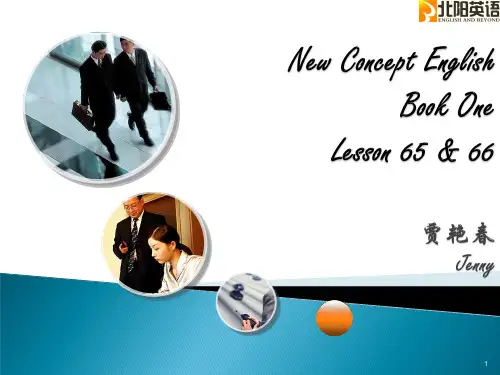
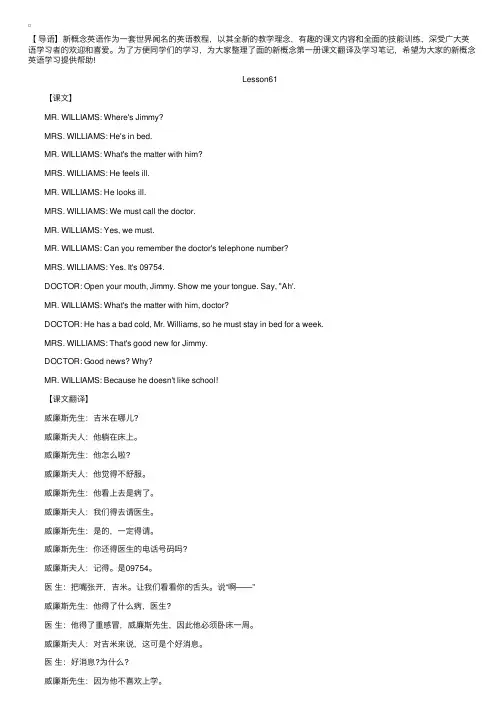
【导语】新概念英语作为⼀套世界闻名的英语教程,以其全新的教学理念,有趣的课⽂内容和全⾯的技能训练,深受⼴⼤英语学习者的欢迎和喜爱。
为了⽅便同学们的学习,为⼤家整理了⾯的新概念第⼀册课⽂翻译及学习笔记,希望为⼤家的新概念英语学习提供帮助!Lesson61 【课⽂】 MR. WILLIAMS: Where's Jimmy? MRS. WILLIAMS: He's in bed. MR. WILLIAMS: What's the matter with him? MRS. WILLIAMS: He feels ill. MR. WILLIAMS: He looks ill. MRS. WILLIAMS: We must call the doctor. MR. WILLIAMS: Yes, we must. MR. WILLIAMS: Can you remember the doctor's telephone number? MRS. WILLIAMS: Yes. It's 09754. DOCTOR: Open your mouth, Jimmy. Show me your tongue. Say, "Ah'. MR. WILLIAMS: What's the matter with him, doctor? DOCTOR: He has a bad cold, Mr. Williams, so he must stay in bed for a week. MRS. WILLIAMS: That's good new for Jimmy. DOCTOR: Good news? Why? MR. WILLIAMS: Because he doesn't like school! 【课⽂翻译】 威廉斯先⽣:吉⽶在哪⼉? 威廉斯夫⼈:他躺在床上。
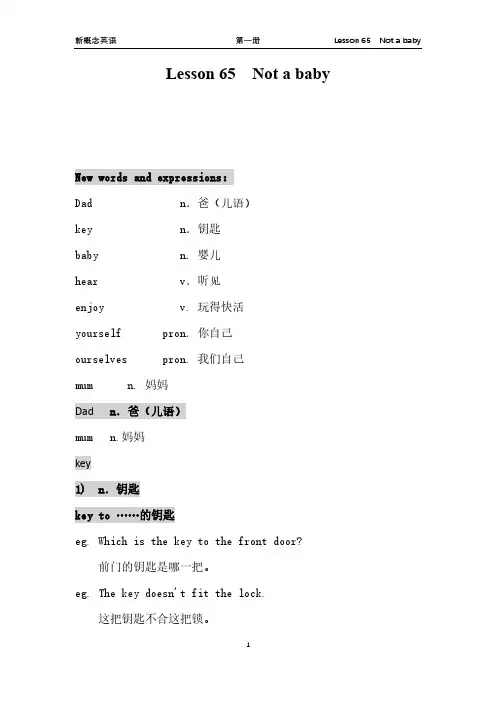
Lesson 65 Not a babyNew words and expressions:Dad n.爸(儿语)key n.钥匙baby n. 婴儿hear v.听见enjoy v. 玩得快活yourself pron. 你自己ourselves pron. 我们自己mum n. 妈妈Dad n.爸(儿语)mum n.妈妈key1) n.钥匙key to ……的钥匙eg. Which is the key to the front door?前门的钥匙是哪一把。
eg. The key doesn't fit the lock.这把钥匙不合这把锁。
2) n. 题解,答案,秘诀the key to the problem 解决这个问题的办法a key to success 成功的秘诀3) n.(乐器,电脑的)键keyboard 键盘hear v.听见listen v,听eg. Listen. Someone is knocking at the door.听,有人敲门。
listen to……听……,表示有意识地去听,强调动作eg. Let's listen to the stereo.我们来听立体声音响吧’hear v. 听见……(强调听到的结果)eg. I can't hear you. 我听不到你说的话。
eg. Do you hear the noise? 你有没有听到声响?hear from……收到……的来信eg. I hear from my boyfriend every week.我每周都收到男朋友的来信。
enjoy v.欣赏,喜爱,享受enjoy + 名词/ doingeg. I enjoy the movie very much.我非常喜欢这部电影。
eg. She enjoys swiming very much. 她非常喜欢游泳。
eg. My daughter doesn't enjoy going to school.我的女儿不喜欢上学。
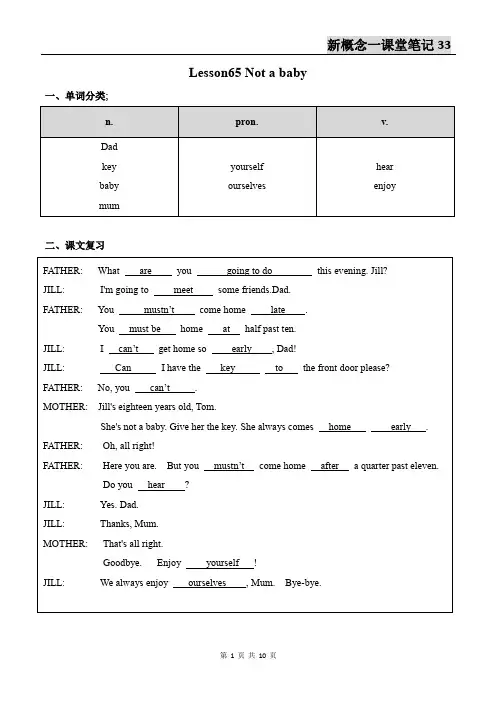

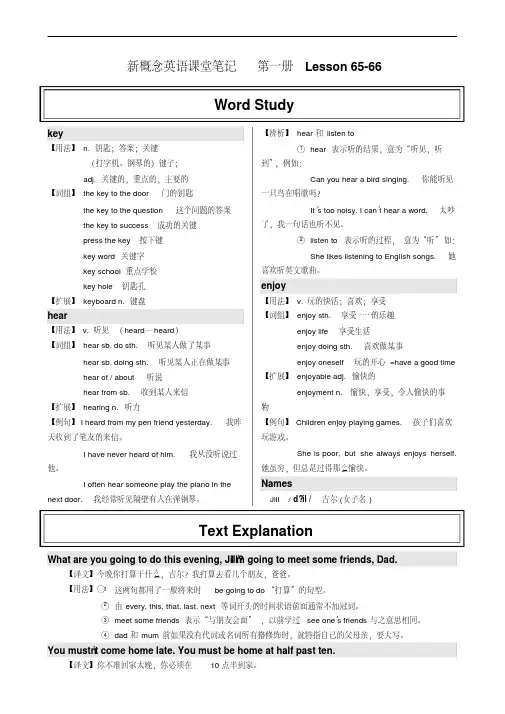
新概念英语课堂笔记第一册Lesson 65-66Word Studykey【用法】n. 钥匙;答案;关键(打字机、钢琴的)键子;adj. 关键的,重点的,主要的【词组】the key to the door 门的钥匙the key to the question 这个问题的答案the key to success 成功的关键press the key 按下键key word 关键字key school 重点学校key hole 钥匙孔【扩展】keyboard n. 键盘hear【用法】v. 听见(heard—heard)【词组】hear sb. do sth. 听见某人做了某事hear sb. doing sth. 听见某人正在做某事hear of / about 听说hear from sb. 收到某人来信【扩展】hearing n. 听力【例句】I heard from my pen friend yesterday. 我昨天收到了笔友的来信。
I have never heard of him. 我从没听说过他。
I often hear someone play the piano in the next door. 我经常听见隔壁有人在弹钢琴。
【辨析】hear和listen to○1hear表示听的结果,意为“听见,听到”,例如:Can you hear a bird singing. 你能听见一只鸟在唱歌吗?It’s too noisy. I can’t hear a word. 太吵了,我一句话也听不见。
○2listen to 表示听的过程,意为“听”如:She likes listening to English songs. 她喜欢听英文歌曲。
enjoy【用法】v. 玩的快活;喜欢;享受【词组】enjoy sth. 享受……的乐趣enjoy life 享受生活enjoy doing sth. 喜欢做某事enjoy oneself 玩的开心=have a good time 【扩展】enjoyable adj. 愉快的enjoyment n. 愉快,享受,令人愉快的事物【例句】Children enjoy playing games. 孩子们喜欢玩游戏。
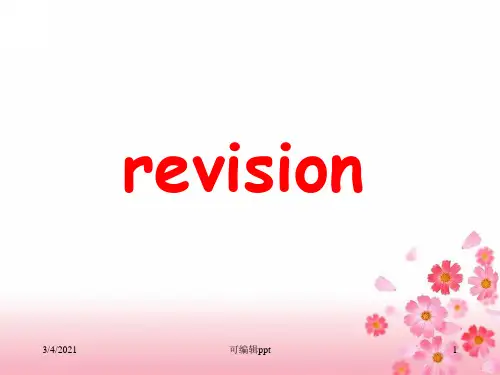
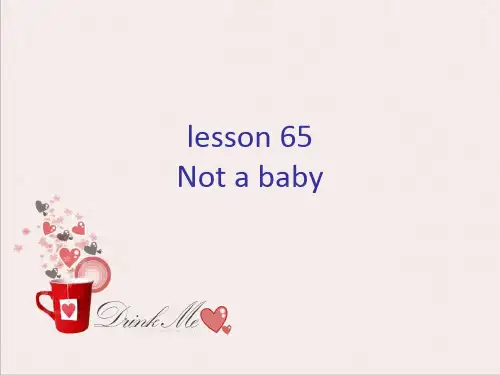
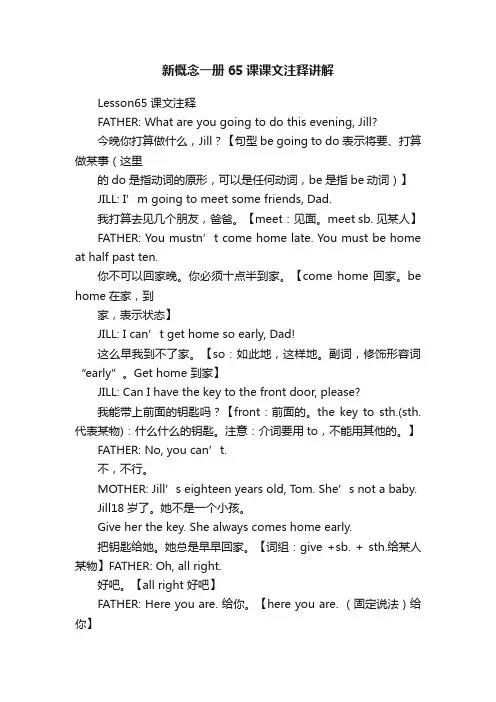
新概念一册65课课文注释讲解Lesson65 课文注释FATHER: What are you going to do this evening, Jill?今晚你打算做什么,Jill?【句型be going to do表示将要、打算做某事(这里的do是指动词的原形,可以是任何动词,be是指be动词)】JILL: I’m going to meet some friends, Dad.我打算去见几个朋友,爸爸。
【meet:见面。
meet sb. 见某人】FATHER: You mustn’t come home late. You must be home at half past ten.你不可以回家晚。
你必须十点半到家。
【come home 回家。
be home在家,到家,表示状态】JILL: I can’t get home so early, Dad!这么早我到不了家。
【so:如此地,这样地。
副词,修饰形容词“early”。
Get home 到家】JILL: Can I have the key to the front door, please?我能带上前面的钥匙吗?【front:前面的。
the key to sth.(sth.代表某物):什么什么的钥匙。
注意:介词要用to,不能用其他的。
】FATHER: No, you can’t.不,不行。
MOTHER: Jill’s eighteen years old, T om. She’s not a baby.Jill18岁了。
她不是一个小孩。
Give her the key. She always comes home early.把钥匙给她。
她总是早早回家。
【词组:give +sb. + sth.给某人某物】FATHER: Oh, all right.好吧。
【all right 好吧】FATHER: Here you are. 给你。
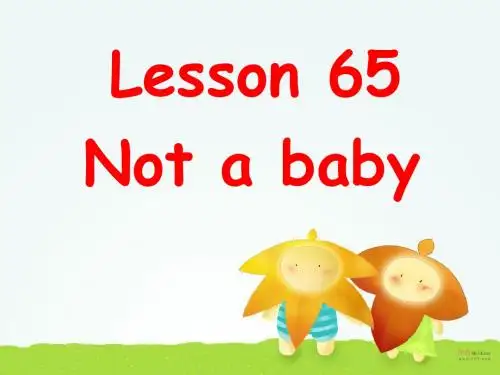
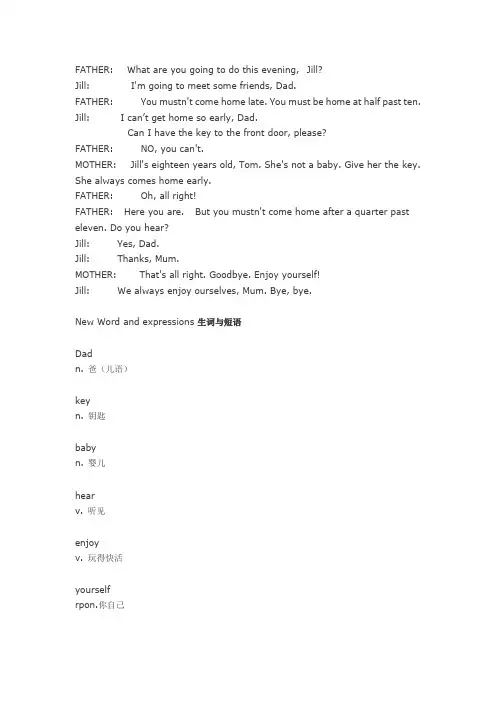
FATHER: What are you going to do this evening, Jill?Jill: I'm going to meet some friends, Dad.FATHER: You mustn't come home late. You must be home at half past ten. Jill: I can’t get home so early, Dad.Can I have the key to the front door, please?FATHER: NO, you can't.MOTHER: Jill's eighteen years old, Tom. She's not a baby. Give her the key. She always comes home early.FATHER: Oh, all right!FATHER: Here you are. But you mustn't come home after a quarter past eleven. Do you hear?Jill: Yes, Dad.Jill: Thanks, Mum.MOTHER: That's all right. Goodbye. Enjoy yourself!Jill: We always enjoy ourselves, Mum. Bye, bye.New Word and expressions 生词与短语Dadn. 爸(儿语)keyn. 钥匙babyn. 婴儿hearv. 听见enjoyv. 玩得快活yourselfrpon.你自己pron.我们自己mumn. 妈妈本文参考译文父亲:今晚你打算干什么,吉尔?吉尔:我打算去看几个朋友,爸爸。
父亲:你不准回家太晚,你必须在10点半到家。
新概念英语第一册第65课
标题:新概念英语第一册第 65 课 (创建与标题相符的正文并拓展)
正文:
新概念英语第一册第 65 课讲述了吉尔晚上要去见几个朋友,但父亲要求她必须在 10 点半回到家。
吉尔想要带上前门的钥匙,但父亲拒绝了。
最后,母亲建议把钥匙给吉尔,并告诉她不能晚于 11 点1 刻回家。
在这堂课中,学生们学习了生词和短语,如
Dad(爸),key(钥匙),baby(婴儿) 等。
拓展:
新概念英语第一册第 65 课是一篇简短的对话,讲述了吉尔晚上要去见几个朋友,但父亲要求她必须在 10 点半回到家。
吉尔想要带上前门的钥匙,但父亲拒绝了。
最后,母亲建议把钥匙给吉尔,并告诉她不能晚于 11 点 1 刻回家。
这篇课文是英语学习中比较常见的场景对话,对于学生来说,有助于他们更好地理解和应用英语。
此外,这篇课文也有助于提高学生的听力和口语能力,因为他们需要听懂对话中的指令和回答问题。
每课一句:新概念英语第1册第65课【往期回顾】每课一句:新概念英语第1册第63课接下来,我们就来看看第65课的“每课一句”。
一、课文原文Lesson 65 Not a babyWhat are you going to do this evening, Jill?I'm going to meet some friends, Dad.You mustn't come home late. You must be home at half past ten.I can’t get home so early, Dad. Can I have the key to the front door, please?No, you can't.Jill's eighteen years old, Tom. She's not a baby. Give her the key. She always comes home early.Oh, all right!Here you are. But you mustn't come home after a quarter past eleven. Do you hear?Yes, Dad.Thanks, Mum.That's all right. Goodbye. Enjoy yourself!We always enjoy ourselves, Mum. Bye, bye.——选自《新概念英语》第一册,外语教学与研究出版社,1997年10月第1版二、每课一句Enjoy yourself!本课虽然还是出现了情态动词can和must的用法,但主要是复习。
本课侧重学习的是反身代词的用法。
反身代词一般是通过物主代词或人称代词与-self(单数)或-selves(复数)来构成的。
英语中的反身代词主要包括:第一人称:myself; ourselves第二人称:yourself; yourselves第三人称:himself, herself, itself;themselves我们可以用oneself来代指所有反身代词。
新概念第一册第65-66课重点知识点(总1页)-CAL-FENGHAI.-(YICAI)-Company One 1■CAL■本页仅作为文档封面,使用请直接删除Unit33 Lesson 65-66一、振振有词1.key 1)钥匙the key to the door f J 的钥匙cut a key 配把钥匙2 )答案the key to the test试卷答棗3)主要的,关键的key man重要人物key player核心队员2.hear听见hear of听说Did you hear of their love story你听说他们的恋爱史了吗hear from收到■…来彳言I hear from him once a week.我每周收到一封他的来信。
3.enjoy玩得世活enjoy oneself 玩得快活She enjoys herself everyday.她每天玩的很开心《enjoy doing sth.祇爱做…-He enjoys reading.他酷爱读书©二、记住下列句子are you going to do this evening 今晚你要做什么2.I am going to meet my friends.義要去见莪府朋友。
3.You mustn^t come home late•你不准回家很晚。
4.Can I have the key to the front door 莪竈看前门的钥匙吗5.You mustn J t come home after a quarter past eleven.你不能超过11 点一刻回家。
三、现身说“法”庶语中,人称代词分为主格,宾格,形容词性物主代词,名词性物主代词以及反身代词。
1)第一,第二人称代词的反身代词是由形容词性物主代词加上self或selves构成my+self=myself our+selves=ourselvesyour+self=yourself your+selves=yourselves2)第三人称的反身代词是由宾格加上self, selves构成的。
新概念英语第一册课文翻译及学习笔记Lesson65【课文】
FATHER: What are you going to do this evening. Jill?
JILL: I'm going to meet some friends. Dad.
FATHER: You mustn't come home late. You must be home at half past ten.
JILL: I can't get home so early, Dad! Can I have the key to the front door please?
FATHER: No, you can't.
MOTHER: Jill's eighteen years old, Tom. She's not a baby. Give her the key. She always comes home early.
FATHER: Oh, all right! Here you are. But you mustn't come home after a quarter past eleven. Do you hear?
JILL: Yes. Dad. Thanks, Mum.
MOTHER: That's all right. Goodbye. Enjoy yourself!
JILL: We always enjoy ourselves, Mum. Bye-bye.
【课文翻译】
父亲:今晚你打算干什么,吉尔?
吉尔:我打算去看几个朋友,爸爸。
父亲:你不准回家太晚,你必须在10点半到家。
吉尔:这么早我到不了家,爸爸!
吉尔:我能带上前门的钥匙吗?
父亲:不行,你不能带。
母亲:吉尔都18岁了,汤姆。
她不是小孩子了。
把钥匙给她吧。
她总早早回家的。
父亲:那么,好吧!
父亲:拿去。
但你不能超过11点1刻回家。
听见了吗?
吉尔:听见了,爸爸。
谢谢,妈妈。
母亲:不用谢。
再见。
好好玩吧!
吉尔:我们总是玩得很开心的,妈妈。
再见。
【生词】
Dad n. 爸(儿语)
key n. 钥匙
baby n. 婴儿
hear v. 听见
enjoy v. 玩得快活
yourself rpon.你自己
ourselves pron.我们自己
mum n. 妈妈
【知识点讲解】
1. going to do sth. 意思是打算做什么、将要做什么?
2. half past ten,意思是十点半,也能够直接说成ten
thirty;a quarter past eleven,意思是11点一刻,quater就是一刻,四分之一的意思,11:15也能够直接说成eleven fifteen。
这里我们看到关于精确时间的表达,几点钟、几分,最简单的表达当然就是直接把数字读出来。
比如09:05读作nine O five;12:35读成twelve thirty five……
“过” 这个表达,就如文中讲到那样用“past”这个介词;如果是“不到”则用"to"这个介词。
比如“差10分钟10点” 就能够读成ten to ten。
3. enjoy yourself!意思是好好玩,也能够简单说成"enjoy!" 在很多场合都能够用得上,比如祝朋友有个好旅行、好好吃一顿、运动一下等等,在很多行动之前你都能够用它来表达一种祝愿。